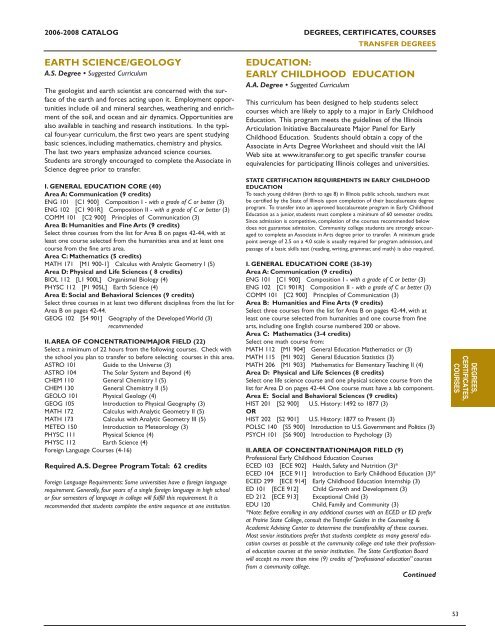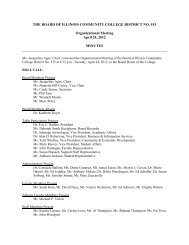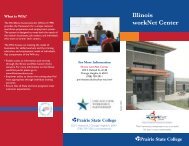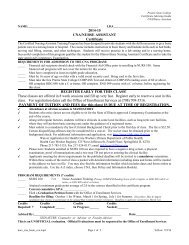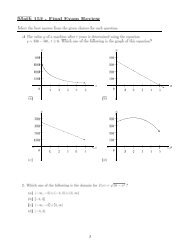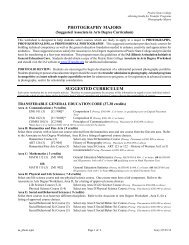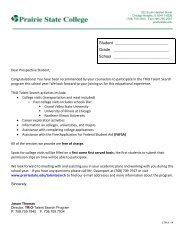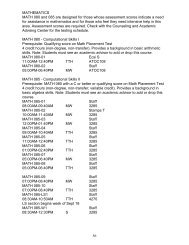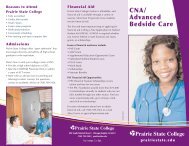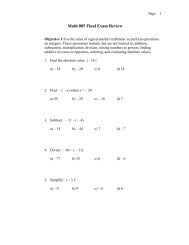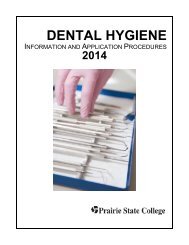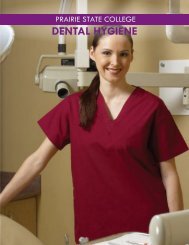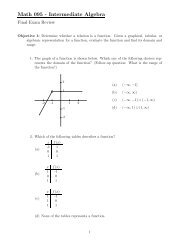catalog - Prairie State College
catalog - Prairie State College
catalog - Prairie State College
- No tags were found...
Create successful ePaper yourself
Turn your PDF publications into a flip-book with our unique Google optimized e-Paper software.
2006-2008 CATALOGEARTH SCIENCE/GEOLOGYA.S. Degree • Suggested CurriculumThe geologist and earth scientist are concerned with the surfaceof the earth and forces acting upon it. Employment opportunitiesinclude oil and mineral searches, weathering and enrichmentof the soil, and ocean and air dynamics. Opportunities arealso available in teaching and research institutions. In the typicalfour-year curriculum, the first two years are spent studyingbasic sciences, including mathematics, chemistry and physics.The last two years emphasize advanced science courses.Students are strongly encouraged to complete the Associate inScience degree prior to transfer.I. GENERAL EDUCATION CORE (40)Area A: Communication (9 credits)ENG 101 [C1 900] Composition I - with a grade of C or better (3)ENG 102 [C1 901R] Composition II - with a grade of C or better (3)COMM 101 [C2 900] Principles of Communication (3)Area B: Humanities and Fine Arts (9 credits)Select three courses from the list for Area B on pages 42-44, with atleast one course selected from the humanities area and at least onecourse from the fine arts area.Area C: Mathematics (5 credits)MATH 171 [M1 900-1] Calculus with Analytic Geometry I (5)Area D: Physical and Life Sciences ( 8 credits)BIOL 112 [L1 900L] Organismal Biology (4)PHYSC 112 [P1 905L] Earth Science (4)Area E: Social and Behavioral Sciences (9 credits)Select three courses in at least two different disciplines from the list forArea B on pages 42-44.GEOG 102 [S4 901] Geography of the Developed World (3)recommendedII.AREA OF CONCENTRATION/MAJOR FIELD (22)Select a minimum of 22 hours from the following courses. Check withthe school you plan to transfer to before selecting courses in this area.ASTRO 101 Guide to the Universe (3)ASTRO 104 The Solar System and Beyond (4)CHEM 110 General Chemistry I (5)CHEM 130 General Chemistry II (5)GEOLO 101 Physical Geology (4)GEOG 105 Introduction to Physical Geography (3)MATH 172 Calculus with Analytic Geometry II (5)MATH 173 Calculus with Analytic Geometry III (5)METEO 150 Introduction to Meteorology (3)PHYSC 111 Physical Science (4)PHYSC 112 Earth Science (4)Foreign Language Courses (4-16)Required A.S. Degree Program Total: 62 creditsForeign Language Requirements: Some universities have a foreign languagerequirement. Generally, four years of a single foreign language in high schoolor four semesters of language in college will fulfill this requirement. It isrecommended that students complete the entire sequence at one institution.DEGREES, CERTIFICATES, COURSESTRANSFER DEGREESEDUCATION:EARLY CHILDHOOD EDUCATIONA.A. Degree • Suggested CurriculumThis curriculum has been designed to help students selectcourses which are likely to apply to a major in Early ChildhoodEducation. This program meets the guidelines of the IllinoisArticulation Initiative Baccalaureate Major Panel for EarlyChildhood Education. Students should obtain a copy of theAssociate in Arts Degree Worksheet and should visit the IAIWeb site at www.itransfer.org to get specific transfer courseequivalencies for participating Illinois colleges and universities.STATE CERTIFICATION REQUIREMENTS IN EARLY CHILDHOODEDUCATIONTo teach young children (birth to age 8) in Illinois public schools, teachers mustbe certified by the <strong>State</strong> of Illinois upon completion of their baccalaureate degreeprogram. To transfer into an approved baccalaureate program in Early ChildhoodEducation as a junior, students must complete a minimum of 60 semester credits.Since admission is competitive, completion of the courses recommended belowdoes not guarantee admission. Community college students are strongly encouragedto complete an Associate in Arts degree prior to transfer. A minimum gradepoint average of 2.5 on a 4.0 scale is usually required for program admission, andpassage of a basic skills test (reading, writing, grammar, and math) is also required.I. GENERAL EDUCATION CORE (38-39)Area A: Communication (9 credits)ENG 101 [C1 900] Composition I - with a grade of C or better (3)ENG 102 [C1 901R] Composition II - with a grade of C or better (3)COMM 101 [C2 900] Principles of Communication (3)Area B: Humanities and Fine Arts (9 credits)Select three courses from the list for Area B on pages 42-44, with atleast one course selected from humanities and one course from finearts, including one English course numbered 200 or above.Area C: Mathematics (3-4 credits)Select one math course from:MATH 112 [M1 904] General Education Mathematics or (3)MATH 115 [M1 902] General Education Statistics (3)MATH 206 [M1 903] Mathematics for Elementary Teaching II (4)Area D: Physical and Life Sciences (8 credits)Select one life science course and one physical science course from thelist for Area D on pages 42-44. One course must have a lab component.Area E: Social and Behavioral Sciences (9 credits)HIST 201 [S2 900] U.S. History: 1492 to 1877 (3)ORHIST 202 [S2 901] U.S. History: 1877 to Present (3)POLSC 140 [S5 900] Introduction to U.S. Government and Politics (3)PSYCH 101 [S6 900] Introduction to Psychology (3)II.AREA OF CONCENTRATION/MAJOR FIELD (9)Professional Early Childhood Education CoursesECED 103 [ECE 902] Health, Safety and Nutrition (3)*ECED 104 [ECE 911] Introduction to Early Childhood Education (3)*ECED 299 [ECE 914] Early Childhood Education Internship (3)ED 101 [ECE 912] Child Growth and Development (3)ED 212 [ECE 913] Exceptional Child (3)EDU 120 Child, Family and Community (3)*Note: Before enrolling in any additional courses with an ECED or ED prefixat <strong>Prairie</strong> <strong>State</strong> <strong>College</strong>, consult the Transfer Guides in the Counseling &Academic Advising Center to determine the transferability of these courses.Most senior institutions prefer that students complete as many general educationcourses as possible at the community college and take their professionaleducation courses at the senior institution. The <strong>State</strong> Certification Boardwill accept no more than nine (9) credits of “professional education” coursesfrom a community college.ContinuedDEGREES,CERTIFICATES,COURSES53


